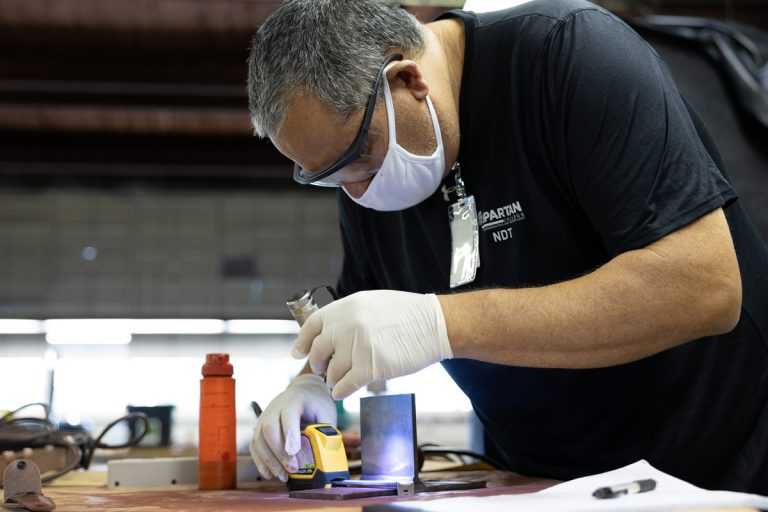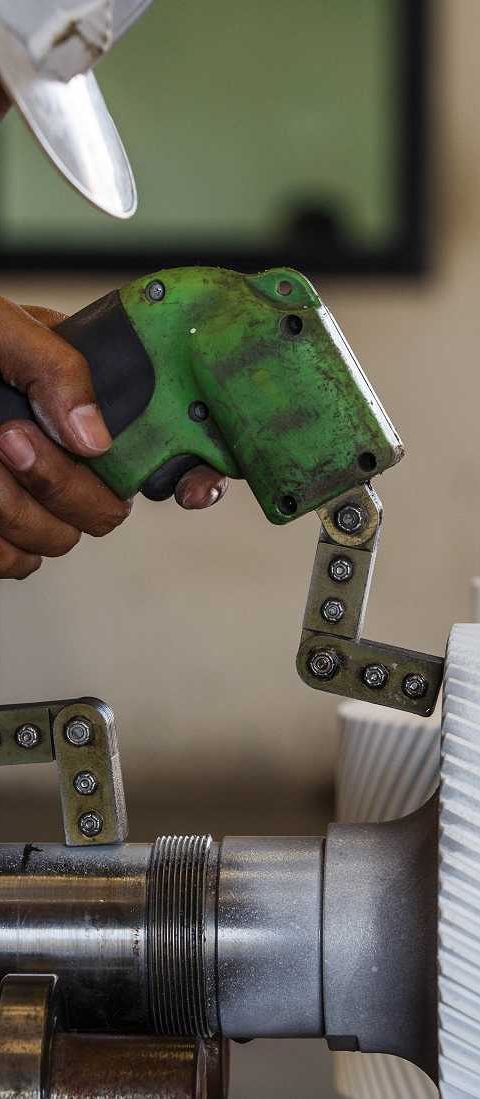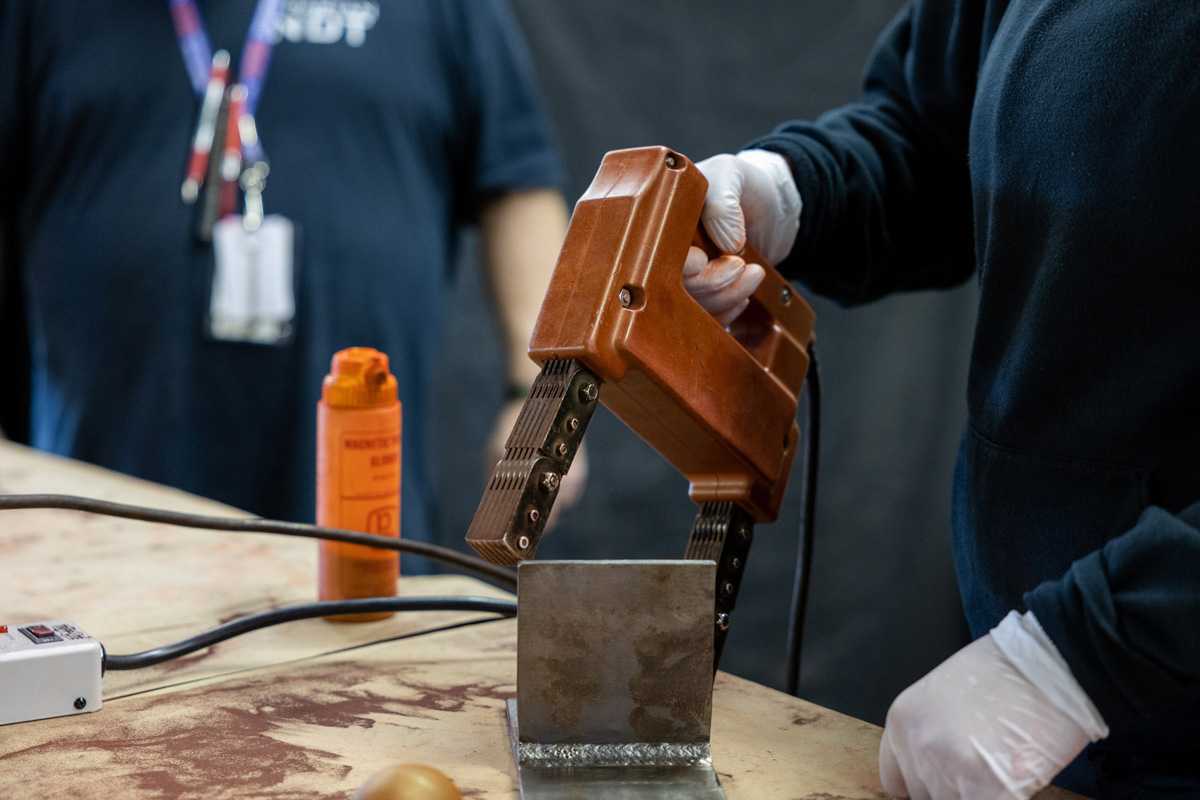

Almost anyone interested in science or engineering is able to find something to like about the practice of nondestructive testing (NDT) and the technology associated with it — which is why we’ve crafted a nondestructive testing and quality control 101. This fascinating and exciting field is a large piece of the puzzle that helps keep the airline industry safe and flying high, while also discovering new innovations along the way. In this article, we'll explore what nondestructive testing and quality control 101 entail. Plus, we’ll cover the training you can receive in Nondestructive Testing Technology and Quality Control Management at Spartan College of Aeronautics and Technology.
Before we begin, we do want to make one thing clear: Nondestructive testing is a broad field that encompasses dozens of different testing mechanisms and technologies across many different fields of engineering. Since Spartan College is an aeronautics and technology trade school, the types of nondestructive testing that we offer, which we describe below, all have a direct relation to the fields of aviation. However, many graduates have gone on to a variety of fields outside of aeronautics.
An easy way to help describe nondestructive testing technology is by comparing it to its engineering "cousin," destructive testing (DT). The names of these two distinct fields explain the difference in a pretty obvious way.
In destructive testing, mechanical parts or components — or an entire vehicle — are tested by destroying them in certain, controlled conditions. The investigators (AKA technicians) then compile data from the results.
In nondestructive testing, technicians become investigators who explore the mechanical properties of parts or components without destroying, harming, or disrupting anything. Parts and components can even be tested while a vehicle or aircraft is in operation. The components are tested against strict guidelines to make sure that they are not only operable but safe as well.
One common type of destructive testing that most people have heard of is vehicle crash test ratings. The National Highway Traffic Safety Administration (NHTSA) carries out destructive tests every year on different types of automobiles. For example, when a new model year and design of a Ford, Chevrolet, or Tesla vehicle comes out, the NHTSA will buy five copies of that vehicle and then smash them in five different ways!
The NHTSA straps a lifelike ragdoll, or more commonly known as "crash test dummies," in the seatbelts and then proceeds to destroy the five brand-new cars. The tests used typically include front collision, rear collision, passenger-side collision, driver-side collision, and rollover tests. Technicians are able to derive a lot of valuable vehicle safety information for car buyers from these tests, and the NHTSA assigns safety scores to vehicles based on this destructive testing regimen.
But this is also wildly expensive. At the end of a round of testing, the NHTSA's engineers have trashed five brand-new cars or trucks, which are no longer road-worthy without major repairs. While this is an effective testing regimen for automobiles, it doesn't really work for airplanes. But don’t let that worry you.
That's why robust nondestructive testing and quality control 101 knowledge are so important to the aeronautics industry. The various components and parts of an airplane can be tested using sophisticated diagnostic equipment and strict guidelines. If a part or component passes the nondestructive tests, it is still airworthy and does not need to be discarded.
We offer two different training tracks at Spartan College for nondestructive testing technology(NDT) and quality control management (QCM). Successful applicants can earn their NDT diploma by following a 10-month course track. The QCM program takes as few as 15 months, and upon successful completion a graduate earns an Associate of Applied Science.
Another way to look at it is: If you complete the 10-month nondestructive testing coursework, then it only takes an additional five months to finish your associate degree in Quality Control Management.
Our NDT program at Spartan College focuses on the various types of testing and analysis used in aviation fields, the additional QCM coursework is geared more toward the management of systems and people that extend beyond the field. NDT and QCM go hand-in-hand, but QCM requires additional training.
If you're interested in Nondestructive Testing Technology and Quality Control Management, here's a closer look at the coursework you can take in our program.
X-rays aren't just an important diagnostic tool for doctors and veterinarians; they're also used extensively in the field of nondestructive testing. Radiation can be passed through parts or components to check for internal defects. At Spartan College, you will learn how to:
This type of nondestructive testing technology uses a magnetic field to detect problems near the surface of components with ferromagnetic properties. However, aircraft typically are made of aluminum which do not have ferromagnetic properties. Students will learn how to set up and apply magnetic particle testing equipment, and how to interpret test results.


Eddy current testing is a very specialized type of nondestructive testing technology that has many applications in aviation – and is used frequently in the aviation industry. These tests are carried out by bringing a coil charged with alternating current next to components and materials. This generates a magnetic field near the components being tested and creates eddy currents nearby.
Eddy current testing can be used to:
Students in Spartan College's NDT program will learn the electromagnetic theories behind eddy current testing, and how to perform various eddy current tests on different types of components and materials.
Liquid penetrant testing allows an investigator to find cracks or flaws in a material that are otherwise invisible to the human eye. A low-viscosity liquid is applied to a material for this type of NDT test. The liquid is drawn into any design flaws or cracks to make them visible.
Students will learn the principles of liquid penetrant testing, the different types of solvents and liquids used for these tests, and how to interpret the results.
Radiographic testing works best on some types of components, but ultrasound works better on others. Ultrasonic testing is performed by beaming high frequency sound waves through an object. When features in that object reflect the sound back, it generates a computerized image that allows the tester to examine the inside of certain objects or parts.
There are nearly a dozen different types of ultrasonic test types used in the NDT field, but our coursework at Spartan College primarily focuses on the types specific to the aviation and various industries. When students complete this course, they'll understand the principles of ultrasound testing and will have real-world experience in setting up and using ultrasonic equipment, as well as interpreting results.
Every type of nondestructive testing taught at Spartan College utilizes visual inspection at some level, so this course is extremely important if you're interested in the NDT field. Visual testing is usually assisted by some type of equipment, which can be as simple as a handheld magnifying glass or as complex as a borescope.
Visual testing allows an investigator to look for rust or corrosion on parts, misalignment, flaws, cracks or other types of damage. Students learn basic principles of metallurgy in this coursework. You will also learn how to visually detect flaws and take precision measurements using a variety of tools and gauges specific to the aircraft industry.
Trained quality control personnel are vital assets to keep airplanes in the sky and safe to fly in. Our Quality Control Management degree program at Spartan College offers students quality management techniques not typically included in the nondestructive testing program.
Students in our QCM program will also take general education courses geared toward broadening your skill sets in a quality control setting with an associate degree. This includes coursework on improving interpersonal skills like verbal and written communication, as well as customer service. The testing and coursework you complete at Spartan College are applicable to many other industries, including the aviation industry.
Quality control managers and inspectors are utilized in the railroad industry, construction, manufacturing, and even amusement parks (gotta keep those roller coasters running safe and smooth)!
Our Nondestructive Testing Technology (NDT) and Quality Control Management programs are taught at our campus in Tulsa, Oklahoma. If you are interested in these training programs, you will need at least a high school diploma or GED as a prerequisite to enrollment. If you are under 18 and are still in the process of finishing high school, you're still welcome to check us out — but you'll need a parent to come with you for your in-person interview!
To learn more about the enrollment process or to schedule a tour of the campus, get in touch with our Admissions Office at any time!
Affiliate Partner Program | Jobs at Spartan | Privacy Policy | Opt-out Policy | Privacy Notice - California Residents| Notice of Non-Discrimination | Website Accessibility Help | Transparency in Coverage Act
© 2024 SPARTAN COLLEGE OF AERONAUTICS AND TECHNOLOGY. ALL RIGHTS RESERVED.